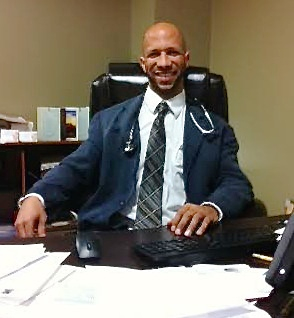
That’s because Dr. Luis Amaro is “double-boarded” – certified in both internal medicine and in pediatrics.
“I like them both,” he says. “It strikes a very good balance that keeps me balanced.”
His pediatrics practice alone would be enough for some physicians.
“You’re actually seeing a spectrum of five age brackets,” he said – newborn, infant, toddler, school age and adolescent. Each has its challenges and its rewards. “It makes it very interesting. I like variety. I like change, and I hate the mundane.”
At each stage, the person is facing transition, and Amaro likes to be there to help guide his patient from one age to the next.
Probably the most significant transition is for the newborn, who is breathing and eating for the first time on his own, in an environment that is typically far less stable than the womb. The challenge at this stage is to adapt to and tolerate the new environment.
Treating newborns and infants is in one way akin to veterinary medicine, Amaro said. That is, the patient isn’t going to be able to verbalize his ailments or concerns. The doctor has to be able to read more subtle signs and he has to rely on clinical analysis, as well as input from the child’s parents.
Care for toddlers and pre-schoolers?
“A lot of that is injury prevention,” Amaro said. The pediatrician acts as a counselor to the parents, explaining that as the child becomes more and more mobile, his surroundings become potentially hazardous.
For instance, he said, more small children are burned by scalding water than in fires; parents have to be aware that tiny fingers can now reach and turn on the hot water tap. They can also open cabinet doors and probe the contents within, be they benign or poisonous.
For the baby and the young child, the pediatrician also monitors milestones. Typically, at about six months a child is able to sit up with assistance; by nine months he’ll be crawling and standing, at a year, walking. There isn’t an exact age for anything, but if a child is way off these marks, it could be an indication of an underlying problem.
“Hearing screening is essential,” Amaro noted. If a child is slow to develop language, it could be because he doesn’t hear properly.
It could also be an indication of other problems, including autism.
“I’m not seeing a lot of that,” Amaro said. But because it is such a serious concern and because “the earlier we can intervene, the better” the chance of ameliorating the condition, pediatricians keep a sharp eye out for any indications.
Of course an infection or an oncologic event can happen to a person at any age, Amaro noted, but that aside, a person’s school years are generally a healthy time, interrupted by occasional minor sickness.
“If they’re ill, it doesn’t take a physician to know it,” he said.
But there is a concern at this stage about obesity. Amaro called it the “biggest affliction” for school age children. He blames poor diet and the lack of exercise, and laments the fact that many schools offer little or no physical education.
“Kids with clinical obesity have shorter life spans than kids without it,” he said. It has enormous implications for their adulthood, setting them up for high blood pressure, diabetes and kidney disease, among other ailments.
As a pediatrician, Amaro counsels children and parents on nutrition and encourages physical activity; he recommends parents limit their child’s sit-down activity time (playing video games, watching television, etc.) to no more than two hours a day.
Issues for his teenaged patients are often rooted in social behavior.
“Adolescence is the age bracket of invincibility,” he said. “It is the age of the here and now and of immediate gratification.”
He finds many teens have trouble separating what happens on a “reality” TV show from true reality.
“You’re looking at a person who is unaware that a gun fight is a final fight. You don’t get up from that,” he said. And it’s not only the victim who suffers. The perpetrator will no longer be free; he will either go to jail or live “in bondage to fear” of revenge.
In less extreme cases, his teen patients often are suffering from stress; this is generally a period of strife between youth and parents.
Those who have a chronic condition, such as diabetes, “are usually going to be poorly controlled,” he said, since they want to be like everyone else – not stand out because they have to take medication.
Amaro said he enjoys his patients at all stages of childhood and finds it especially gratifying when he can work with a patient as he or she develops. Being an internist as well as a pediatrician, he doesn’t have to say goodbye once they reach maturity. He can follow them all the way to geriatrics.
The last of four sons born to Florence and Evaristo Amaro, the doctor grew up on St. Thomas, where he evinced a keen interest in medicine from childhood.
“I’ve always loved the physiology of the human body,” he said. Instead of a teddy bear, he said he carried around a first-aid kit and would try to tend to his brothers’ minor injuries. He preferred home health manuals to story books.
Amaro earned his medical degree from Wright State University Boonshoft School of Medicine in Dayton, Ohio, and did his residency at Jackson Memorial Hospital in Miami.
He is divorced and has two children, a 17-year old son who will enter college later this year, and a 13-year-old daughter in eighth grade.





